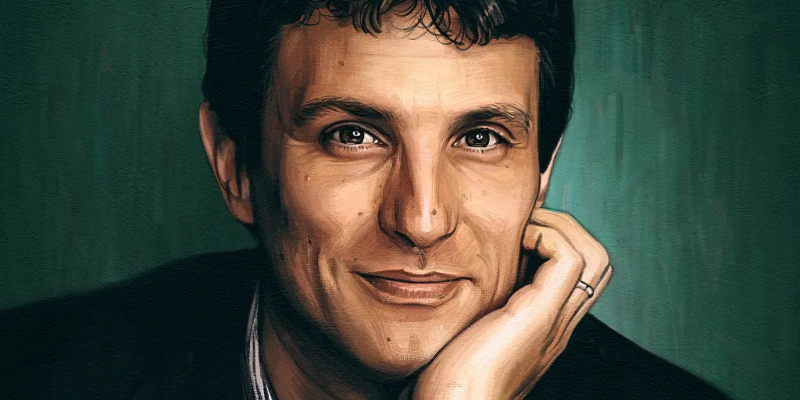David Remnick on the Continued Gift of the Written Word
This Week on the Talk Easy Podcast with Sam Fragoso
Illustration by Krishna Bala Shenoi.
Talk Easy with Sam Fragoso is a weekly series of intimate conversations with artists, authors, and politicians. It’s a podcast where people sound like people. New episodes air every Sunday, distributed by Pushkin Industries.
*
David Remnick has been the editor of The New Yorker since 1998 and a staff writer since 1992. He joins us this week to discuss his latest dispatch from the Middle East, reporting on the aftermath of October 7th in what has become the Israel-Hamas war. He also shares the personal story of Avichai Brodutch, how he imagines this conflict may resolve, and our ‘failure to communicate’ in this increasingly polarized moment.
Then, we turn to Remnick’s personal history: from the art that influenced him growing up in New Jersey to his pathway to journalism at Princeton University and his start at The Washington Post under the tutelage of legendary editor Ben Bradlee. On the back-half, we talk about Remnick’s early days running The New Yorker, the state of journalism today, why he cautions against despair as we head into 2024, and a tribute to the creative longevity of musician Joni Mitchell.
Subscribe and download the episode, wherever you get your podcasts!
From the episode:
Sam Fragoso: A week before you started working as the editor of The New Yorker in 1998, in the June 22nd issue of the magazine, you wrote an article about a critic, Alfred…
David Remnick: Alfred Kazin.
SF: And I wanted to perhaps return to that, the first paragraph of it, and see where it landed with you and how it may be instructive for us in this moment.
DR: “The inexhaustible urge toward self-expression makes it nearly a sure thing that there will always be writers around as long as there is us. The dicier question is whether there will be readers. Not just readers of the sports pages and the jumble, of self-help best-sellers and the consultant’s confessions, no, but passionate readers who ignore the phone and the TV for a few hours to engage a book whose ‘difficulty’ is that it fails to soothe the ego or flatter a limited intelligence; the reader who honestly believes that the best and deepest of what we are is on the shelf, and that to read across the shelf changes the self, changes you.”
SF: When it ran in ‘98, your friend, mentor, and now a staff writer for you, John McPhee, said in The Washington Post, “That’s a pretty good portrait of David himself, and a pretty good forecast of how he’ll run The New Yorker.”
DR: He did? John McPhee, man. Look, I am not blind to the world of Netflix, TikTok, my phone which is sitting six inches away from me. But the fact of the matter is, I know nothing—in our cultural lives, our intellectual lives, in our civic lives—that is as effective, and reaches more deeply, than the best of what is written. I’m a huge movie watcher, and junk television watcher, and ballgame viewer, and, and and! But written expression, that’s what I ended up giving my life toward, and it’s immensely enriching and gratifying, and I believe in it.
I remember very distinctly interviewing Philip Roth, about fifteen years before he died, when I first got to know him, and he was disparaging about writing and—not the literary world, but this piece of business—and I bet you I borrowed the language from him, that he despaired of the notion that not enough people were turning off the TV, turning on a lamp, throwing the phone across the room, and devoting themselves for an hour, or two, or three to a enigmatic, difficult text of any kind. Because it requires a lot of you. I’m guilty enough of that too, even though my professional life demands it, but it’s the gift of a lifetime. The library is a gift, and to ignore it is a sin.
__________________
David Remnick has been the editor of The New Yorker since 1998 and a staff writer since 1992. He has written hundreds of pieces for the magazine, including reporting from Russia, the Middle East, and Europe and Profiles of Barack Obama, Bill Clinton, Katharine Graham, Mike Tyson, Bruce Springsteen, Ralph Ellison, Philip Roth, Benjamin Netanyahu, Leonard Cohen, and Mavis Staples. He also serves as the host of the magazine’s national radio program and podcast, “The New Yorker Radio Hour.” He is the author of seven books as well as editor or co-editor of several collections of New Yorker articles. He has taught at Princeton University, where he received his B.A., in 1981, and at Columbia University. He lives in New York with his wife, Esther Fein; they have three children, Alex, Noah, and Natasha.
Sam Fragoso is the host of Talk Easy with Sam Fragoso, a weekly series of conversations with artists, activists, and politicians. His writing has appeared in The Atlantic, Vanity Fair, and NPR. After conducting seminal interviews with icons like Spike Lee, Werner Herzog, and Noam Chomsky, he independently founded Talk Easy in 2016.




















